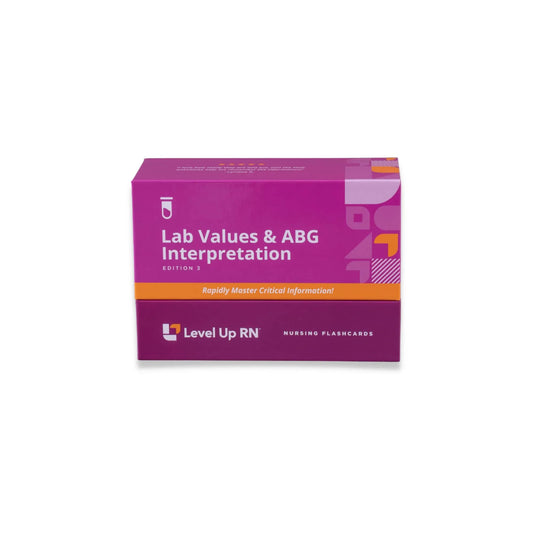Lab Values, part 4: Chloride (Cl)
The function of chloride in the body, the expected range, and some possible causes and symptoms of hypochloremia and hyperchloremia.
Full Transcript: Lab Values, part 4: Chloride (Cl)
Full Transcript: Lab Values, part 4: Chloride (Cl)
Hi, I'm Meris, and in this video, I'm going to be talking to you about the lab value chloride, its expected ranges, and possible causes and symptoms for higher or lower chloride than expected. I'm going to be following along using our lab values flashcards. These are available on our website, leveluprn.com, if you want to grab a set for yourself. Or if you are more of a fan of digital products, I would invite you to check out Flashables, the digital version of all of our flashcards available on demand and at your fingertips. All right. Let's go ahead and get started.
So first up, what is chloride? Chloride is an important electrolyte for the body that has to do a lot with maintaining fluid balance. And it is also present in a lot of digestive juices and enzymes. So chloride is really important. It's not one that we talk about very much, though. And so this is one that you may not have a lot of content on in your program, but it is important to understand what happens when you have elevated chloride or low chloride. So to start with, let's talk about the expected value for chloride. And the expected value here is going to be 98 to 106 milliequivalents per liter, or MEQs per liter, 98 to 106. And again, it's a hard number to remember. That's why we give you our cool chicken hints. We have our little hint here is, I like my hot tub chlorinated, chloride, chlorinated, with a temperature between 98 to 106 degrees. 106 would be a little warm for a hot tub for me, but you never know. So that helps to remind you of what general ballpark we're talking about when it comes to chloride.
Now, hypochloremia. Hypochloremia is the state of having too little chloride. So this is going to be less than 98 MEQs per liter. What are some possible causes here? Metabolic alkalosis is a possible cause along with GI losses such as excessive vomiting or NG tube suctioning. Remember I told you that chloride makes up a lot of those digestive juices. So if I'm losing them, either to vomiting or to suction, then I'm losing chloride with them. Diuretics. Again, I can affect my electrolytes with diuretics always. And then heart failure is another one that can affect it as well. Now, what are some possible symptoms here? These are pretty vague and nonspecific, weakness, fatigue, dyspnea, and confusion. But I always just think about how weak I feel after having a stomach virus or something like that where you're vomiting and vomiting, just very, very weak, very worn down kind of a feeling.
Now, hyperchloremia, where we're talking about being above 106 MEQs per liter. What are some possible causes here? Well, I told you metabolic alkalosis can cause hypo. Metabolic acidosis can cause hyperchloremia. We can also have dehydration. If I don't have enough fluid, my electrolytes are going to appear to be more elevated than usual because they're not being diluted by that fluid in my intravascular space. And then excess salt intake. This gets people sometimes because they say salt is sodium. 100% it is. It's actually sodium chloride, NaCl. They're together as table salt, and in your body, they dissociate into their separate ions. When that happens, I now have an increase in chloride as well as sodium. So don't forget that those two are good friends, and they travel together a lot. So if I take in too much salt, I will also be taking in too much chloride.
One of the other things that I like to add to this list when we're talking about salt is IV fluid resuscitation. For you, when you are a practicing nurse, this will be very important for you. If I'm giving IV fluids, specifically one that has Na and CL, such as - I don't know - normal saline-- if I'm giving a lot of normal saline, I'm giving a lot of salt, and I'm also giving an IV fluid that is on the acidic side. So when I'm doing that, I have the potential to cause what is called hyperchloremic metabolic acidosis. This means this is metabolic acidosis that is originating from the fact that we have too much chloride in the blood. So if you are aggressively fluid resuscitating somebody like a patient who is severely dehydrated, in sepsis, a burn, something of that nature, you need to be concerned about how much sodium chloride are we giving them because both of these can become out of whack as a result.
All right. Now, some symptoms of hyperchloremia. Unfortunately, it's also kind of vague and nonspecific. Weakness, fatigue, thirst, and muscle cramps. Just think about if I have too much like NaCL, I'm real salty, right? I'm going to want to dilute it down. I'm going to feel thirsty. So that can help you to remember that that can be an associated symptom with hyperchloremia.
All right. I'm so glad you stayed until the end because I'm going to test your knowledge of some key facts I provided in this video using our quiz questions.
The nurse is caring for a patient experiencing hyperchloremia. Which acid/base imbalance should the nurse anticipate?
Metabolic acidosis.
The nurse is caring for a patient who requires ongoing low intermittent gastric suctioning through an NG tube. Which electrolyte imbalance should the nurse anticipate?
Hypochloremia.
All right. That is it for this video. Thank you so much for watching. I hope you found it useful or that you learned something. All right. I'll see you in the next one. Thanks so much and happy studying.


